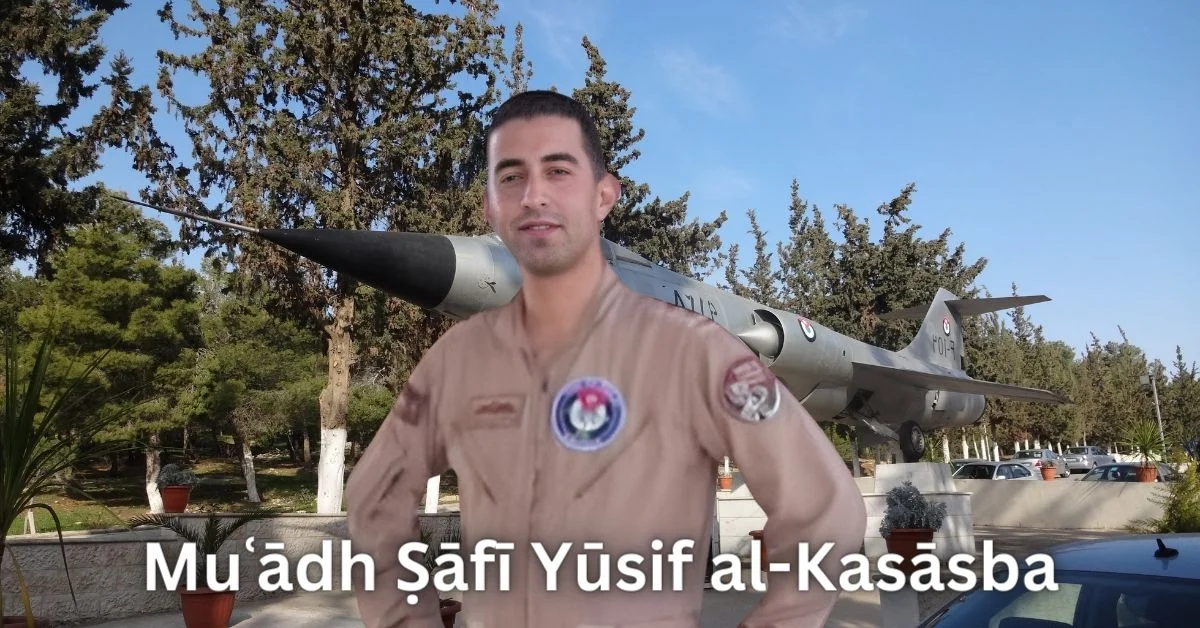In early 2015, the world was gripped with horror as news broke about the brutal execution of Muʿādh Sāfī Yūsif al-Kasāsba, a Jordanian military pilot who had been captured by ISIS. His death remains one of the most harrowing moments in the fight against terrorism, but his courage, resilience, and ultimate sacrifice are remembered as symbols of defiance against tyranny. This article looks at the man behind the uniform, the circumstances surrounding his capture, and the lasting legacy of Muʿādh’s life.
Beginnings
Muʿādh Sāfī Yūsif al-Kasāsba was born in Karak, Jordan, in 1988 into a family deeply rooted in the values of honor and duty. Growing up in a culture that revered military service, Muʿādh harbored a strong desire to serve his country. His dream was realized when he joined the Jordanian Air Force, where his skills as a pilot quickly shone. His dedication to the safety and defense of his nation, as well as his ability to navigate dangerous war zones, made him one of Jordan’s most promising pilots.
At the height of his career, Muʿādh found himself on the front lines of a global battle against the spread of ISIS, a terrorist organization responsible for widespread destruction and atrocities throughout the Middle East.
Capture
On December 24, 2014, during a mission as part of the U.S.-led coalition against ISIS, Muʿādh’s F-16 jet was shot down near Raqqa, Syria, a known ISIS stronghold. His plane malfunctioned, forcing him to eject. While descending, Muʿādh was captured by ISIS militants.
His capture marked a dark turn, not just for Muʿādh and his family, but for the entire region. The terrorist organization saw his capture as an opportunity to manipulate global attention, using his captivity as a tool to inspire fear and pressure Jordan and its allies. Videos were released showing Muʿādh pleading for his life, but ISIS’s brutal methods were already well-known, and hopes for his safe return began to fade.
Execution
On February 3, 2015, the world learned of Muʿādh al-Kasāsba’s execution in the most horrific manner imaginable. ISIS released a video showing him being burned alive while trapped in a cage. The execution was not only a violation of basic human rights but also a calculated act of propaganda aimed at inciting fear. It sent shockwaves through the global community.
For Jordan, the execution was deeply personal. Muʿādh was not just a soldier; he was a symbol of national pride. His death unified the Jordanian people in grief and anger, leading to mass demonstrations across the country, all calling for swift retribution against ISIS. The Jordanian government responded with a series of airstrikes against ISIS positions, calling it “just the beginning” of their revenge.
Legacy
Muʿādh’s legacy, however, extends far beyond the horrific circumstances of his death. In Jordan, he is regarded as a national hero. His bravery, particularly in facing the unimaginable, continues to inspire generations of Jordanians and others around the world. His death became a rallying cry against extremism, and many credit the global response to his execution as a turning point in the fight against ISIS.
His family, devastated by the loss, has since carried on his memory through various charitable initiatives and public memorials. They often speak of Muʿādh’s deep sense of duty, his love for his country, and his refusal to allow his spirit to be broken, even in the face of his captors.
Global Impact
The execution of Muʿādh Sāfī Yūsif al-Kasāsba also had significant international consequences. It triggered a shift in public opinion, especially in the Middle East, where ISIS had long sought to manipulate and spread fear. Many who had previously been reluctant to confront the terrorist organization took a firmer stance in the aftermath of Muʿādh’s execution. Countries like Jordan intensified their military campaigns against ISIS, recognizing that the organization’s continued existence posed a threat to regional stability.
The world was reminded of the true nature of ISIS—its reliance on fear, intimidation, and cruelty. But Muʿādh’s strength and sacrifice served as a reminder that even in the darkest of moments, there is room for defiance, courage, and unity.
Remembrance
In the years since his death, Muʿādh al-Kasāsba has become a symbol of heroism, not just in Jordan but globally. His name is associated with resilience in the face of extremism and a spirit that refuses to be crushed by terror. Schools, streets, and public squares in Jordan now bear his name, keeping his memory alive for future generations.
His family, particularly his father, Sāfī al-Kasāsba, remains vocal about the need for continued opposition to extremism. In numerous interviews, Sāfī has spoken about his son’s legacy, emphasizing that Muʿādh’s sacrifice was not in vain, and that his death stands as a powerful statement against the forces of terror and oppression.
Conclusion
Muʿādh Sāfī Yūsif al-Kasāsba was far more than a military pilot. He was a son, a brother, a husband, and a national hero. His story is one of unimaginable bravery and sacrifice. Though his life was tragically cut short, his memory continues to inspire resilience against extremism and violence. His legacy, cemented in Jordan’s national consciousness, serves as a reminder that while evil may seek to divide and destroy, the human spirit’s capacity for courage and defiance remains far stronger.



